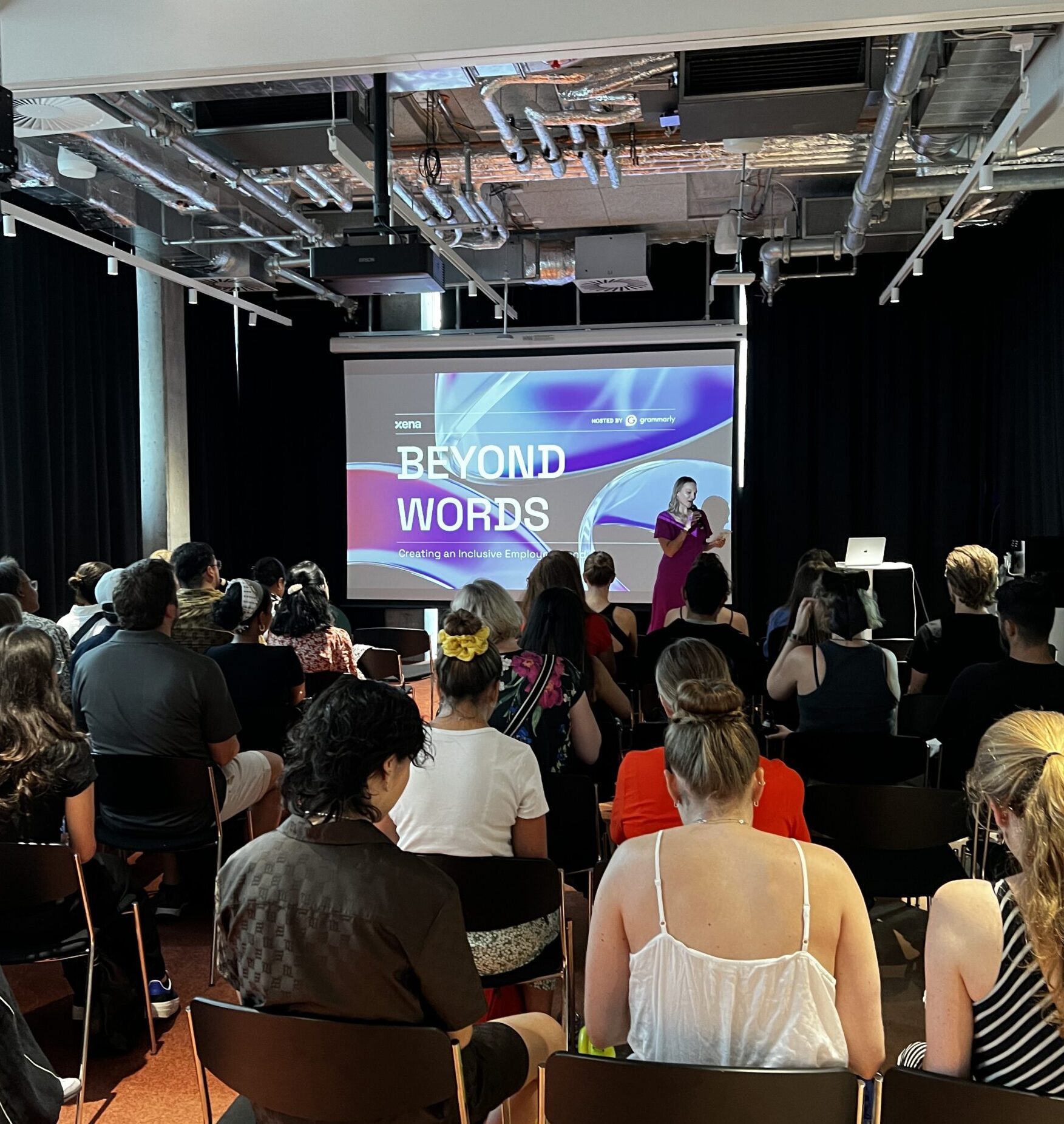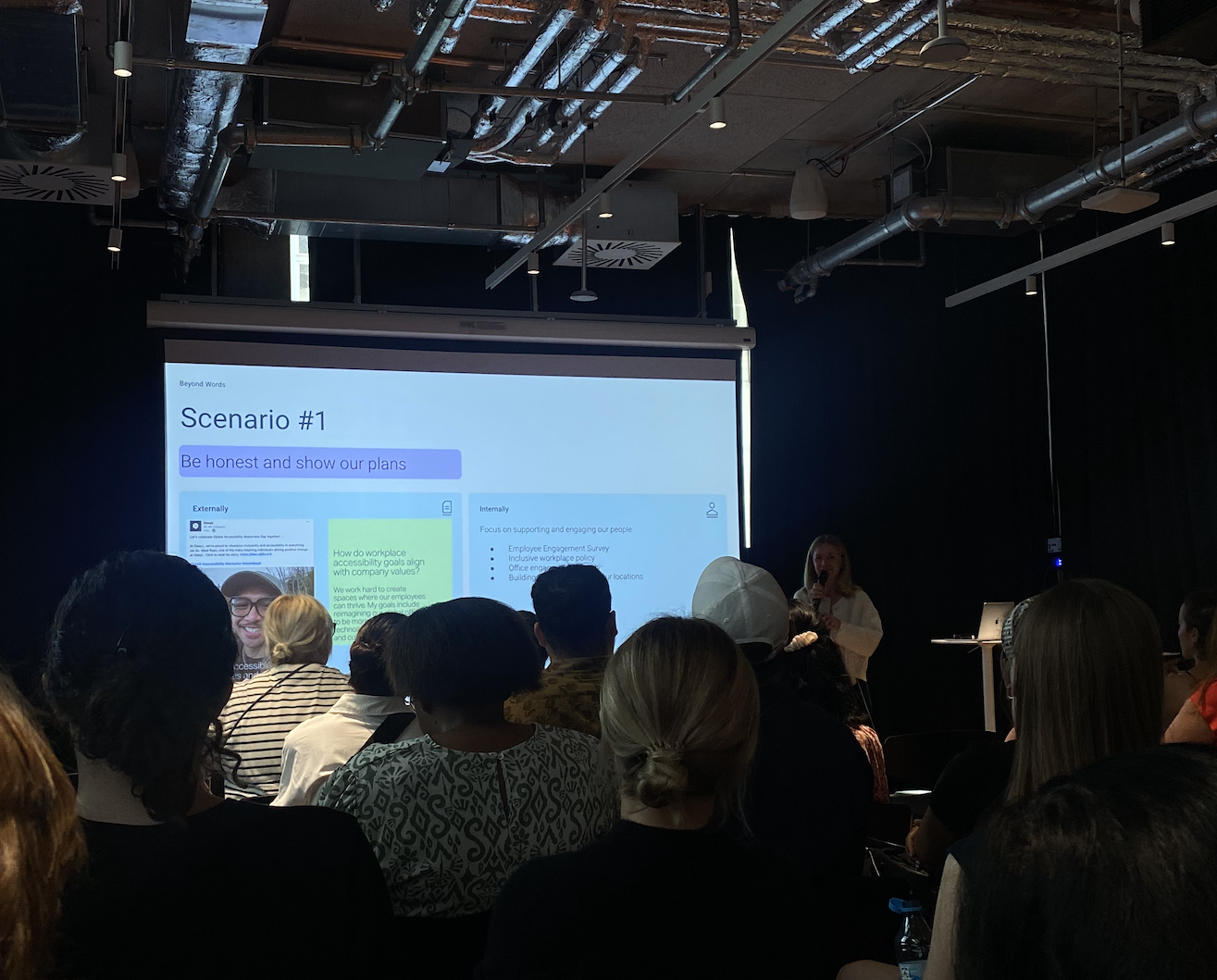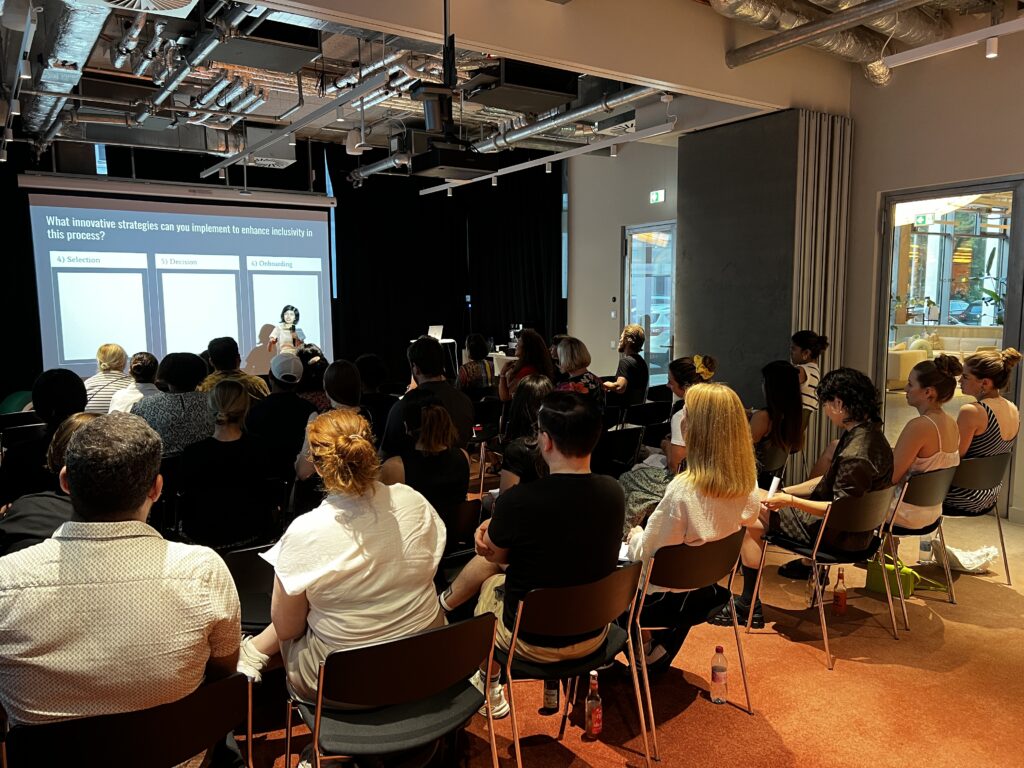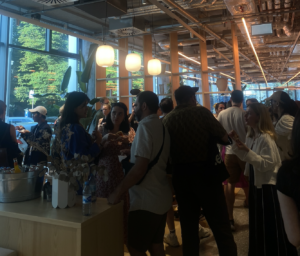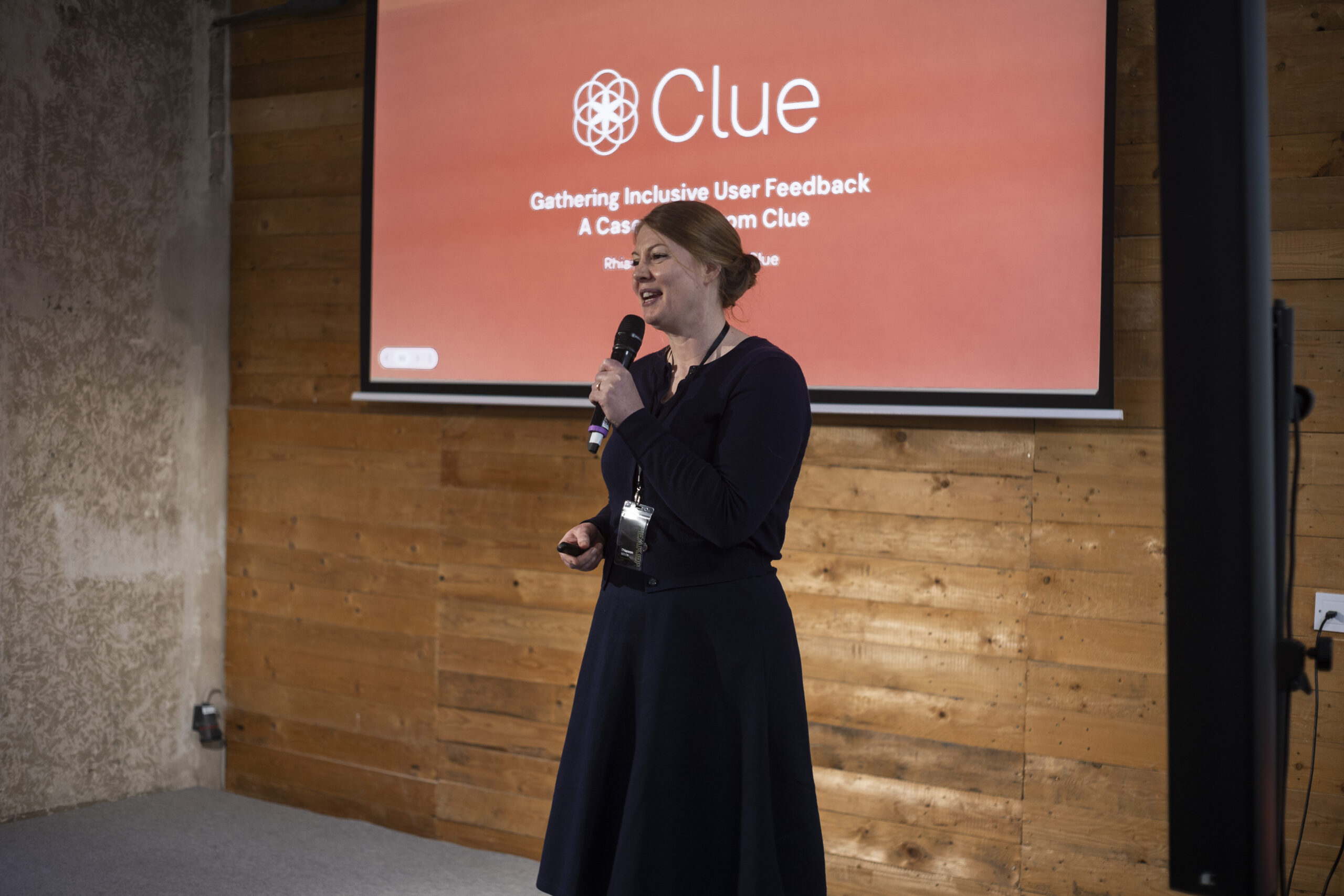7 min. read
Building an Inclusive Brand in Tech
Featuring:
Daria Müller Velasquez – Global Employer Branding Lead at DeepL
Aditi Gupte – Employer Branding Lead at Zalando
How do you become a preferred employer in tech?
This was the brief to our speakers Daria Müller Velasquez and Aditi Gupte at our latest event ‘Beyond Words’ hosted at Grammarly in Berlin. This time from an Employer Branding and Talent Acquisition perspective.
Talent Acquisition and Employer Branding teams play a crucial role in shaping this perception and ensuring that DEI (Diversity, Equity, and Inclusion) values are not just stated, but deeply embedded into the company culture.
To build an inclusive employer brand, it’s crucial to address the structural and cultural barriers that prevent diversity in the tech industry.
So, how can we align Employer Branding with DEI values when the brand still has a lot “to do”?
The journey begins with a thorough understanding of where your company stands in terms of diversity and inclusion, followed by setting realistic and measurable DEI goals.
Meet our Speakers

Daria Müller Velasquez
Global Employer Branding Lead at DeepL
With 15 years of experience in various communication roles, Daria has developed expertise in employer branding, talent attraction, recruitment marketing and candidate experience for some of the world’s leading tech brands. Her recent professional journey includes notable stints with industry giants like HelloFresh and Trendyol (Alibaba Group). Daria’s career is enriched by a global perspective, having worked across Russia, Italy, and Germany, and having lived in many other countries.
Daria’s academic background provides her with a unique blend of creative and strategic insight, helping her to translate complex projects into meaningful and measurable results. Beyond her professional accomplishments, she is passionate about mentoring the next generation of employer branding professionals and serves as a career coach for female expats, empowering them to navigate and thrive in their international careers.
Aditi Gupte
Employer Branding Lead at Zalando
Aditi Gupte is a seasoned marketing leader known in the EB community for her comprehensive expertise in brand identity, creative strategy, and multi-channel campaign execution, encompassing digital, social, print, TV, and radio. With a career spanning 15 years, Aditi has made significant contributions to prestigious organisations such as Zalando, Ogilvy & Mather, and Group M. Her diverse professional journey has taken her across three continents, where she has adeptly catered to markets in MENA and North America.
Guided by a simple philosophy, Aditi believes that significant accomplishments are the result of teamwork and collaboration. She is known for inspiring and energising teams, fostering a collaborative environment that emphasises tasks most beneficial to the organisation. Her ability to unite teams towards common goals has been a key driver of her success. Her remarkable journey reflects her commitment to excellence, innovation, and teamwork.
Beyond Words: Communicating a Diverse and Inclusive Culture
Since 2017, DeepL has been a global leader in language AI, offering state-of-the-art tools to break down language barriers. Trusted by more than 100,000 businesses and millions of individuals, their technology empowers global communication. At the intersection of advanced technology and human interaction, DeepL aims to create a more interconnected world by providing translation software that meets the diverse needs of individual users and large enterprises alike.
When Daria joined DeepL, she had an exciting opportunity to build their employer brand from scratch – a process that was both challenging and fulfilling. Recognizing the importance of showcasing DeepL’s unique culture and inclusiveness, Daria’s employer branding strategies were designed to highlight the company’s commitment to diversity and equity. She believed that integrating employee voices through Employee Resource Groups (ERGs) was crucial for authentically representing DeepL’s values and fostering a sense of belonging.
In paving the path toward building an inclusive culture, DeepL adopted an innovative approach by establishing its Belonging, Equity, Diversity, and Inclusion (BEDI) organization and its first ERGs – Women at DeepL, PROUD-AI, and Ethnicity and Place of Origin. These groups have been instrumental in shaping and promoting the company’s inclusive culture. By amplifying the voices of these ERGs both internally and externally, DeepL ensured that their employer branding initiatives genuinely reflected the diverse and vibrant community within the company.
“Because the best diversity, inclusion, and belonging content always features employee stories as proof.”–Daria
Here are some examples of how to merge your efforts with actionable steps:
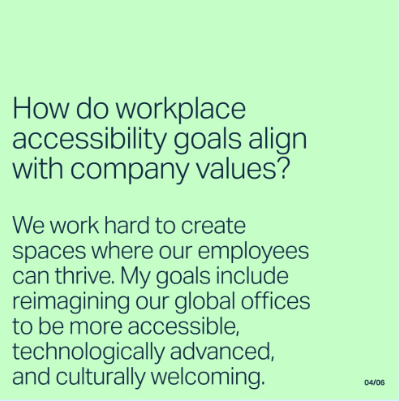
1. Be Honest with Your Plans
Transparency with prospective candidates and current employees about your progress is crucial. Start internally by:
– Conducting regular employee engagement surveys to measure satisfaction and identify areas for improvement.
– Implementing and maintaining an inclusive workplace policy that promotes diversity and equality.
– Developing an office engagement strategy to ensure all employees feel connected and valued.
– Encouraging community building across locations to cultivate a unified culture.
Once you have collected all the data, listened to your employees, and identified opportunities, openly communicate these insights to external audiences to build a genuine connection.
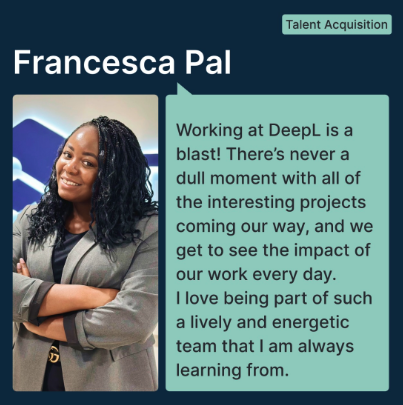
2. Showcase Your Unique Brand of Inclusion
Understand your brand’s distinctiveness. Assess your company’s strongest selling points and current reputation to identify the unique qualities you want to communicate externally. Is it culture? A career catalyst? Citizenship? Internally, support this process by:
– Empowering teams to bring their unique perspectives and innovations by encouraging diversity of thought and practice.
– Setting aside time for teams to “hack” a project or problem, fostering creative problem-solving and collaboration.
– Engaging employees in projects that highlight their strengths and interests.
– Holding regular team meetings to ensure open communication and continuous improvement.
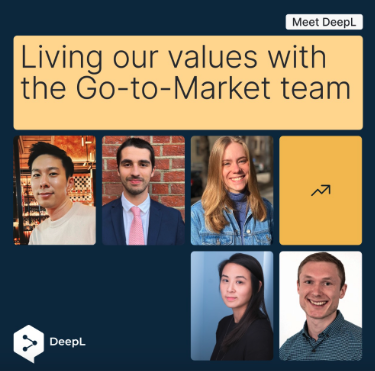
3. Bring Multiple Voices Together
Inclusion and belonging are linked to increased innovation, satisfaction, and overall business success. Share personal stories of thriving teams by highlighting the importance of living your core values. This approach shows how employees thrive together, driving both team and organizational excellence.
Internally, reinforce these efforts by creating a Values in Action Award. Encourage employees to nominate teams or individuals who exemplify your company’s values, integrating this initiative into all internal communications to reinforce your commitment.
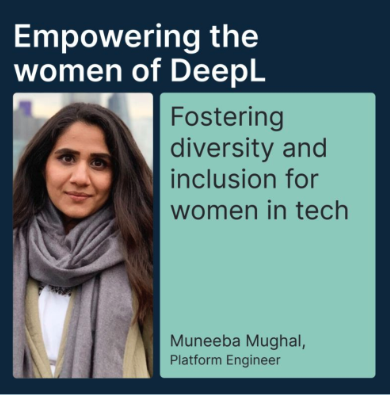
4. Go Deep with Standalone Stories
Delve deeper into individual stories, recognizing that content featuring individual storytellers allows employees’ personal experiences to shine. This approach helps candidates relate to the storyteller and build strong connections to the company culture.
Internally, celebrate occasions such as Women’s History Month by launching campaigns that include online and in-person events, engaging communications, and inclusive activities like creating music playlists for and by your employees. These initiatives reinforce the importance of creating a community where everyone feels connected.
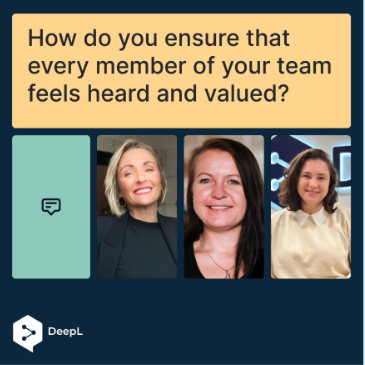
5. Integrate Leadership Voices
Incorporate leadership voices into your communications strategy, recognizing their pivotal role in fostering an inclusive and empowering culture. Externally, showcase leaders discussing the importance of open communication and empowering team members. This demonstrates the company’s commitment to inclusion and shows candidates the leaders’ dedication to creating a supportive environment.
Internally, support leaders through dedicated leadership training and key practices that help them effectively support their teams.
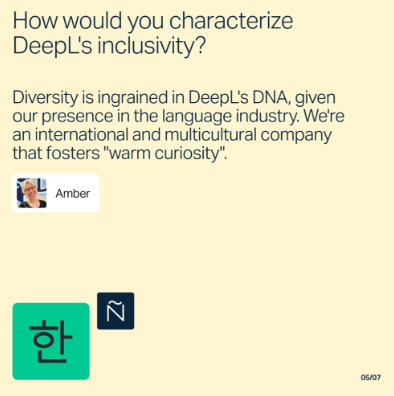
6. Celebrate (e.g. Pride)
Acknowledge challenges while celebrating successes, such as during Pride Month. Share employees’ stories about their experiences with pride, belonging, and allyship in the workplace. Launch an internal campaign focused on educating and empowering your community, which can include hosting special events, creating playlists, and partnering with organizations dedicated to creating LGBTIQ+-friendly environments.
By following these steps, you can effectively communicate a diverse and inclusive culture both internally and externally, fostering an environment where everyone feels valued and empowered.
How To Measure Success
Of course, the specific metrics may vary depending on the data available within your company. However, Daria recommends the following useful metrics to help guide your journey, all focused on employee engagement and experience:
N unique users visiting our internal pages
N% membership growth in our ERG Slack channels
N% internal campaign engagement
N% employee satisfaction
N employee advocates
N% engagement score
N employees participating in our initiatives
Externally, focus on metrics that drive your social media engagement and awareness, such as:
N% engagement rate
N impressions
N likes
N shares
N comments
N mentions
Candidate experience in the light of inclusivity.
How are candidates interacting with your brand?
Aditi’s topic/workshop was divided into three different parts ending with some useful book recommendations & practical tips that can help organisations,
The first one being Candidate experience in the light of inclusivity!
“Maintaining a strong focus on the candidate and employee experience journey will remain essential to the Employer Branding function over the next 3-5 years.” – Randstad 2024, Top 10 Talent Trends Report
Aditi conducted a workshop and interactive session where she shared valuable strategies on the Candidate Experience Journey (CEJ). She began by defining the stages of the CEJ and provided insights on how to ensure inclusivity at each stage from an employer branding perspective.
1. Awareness
2. Consideration
3. Application
4. Selection
5. Decision
6. Onboarding
7. Engagement
Streamlined Application Process:
– Ensure the application process is user-friendly and mobile-optimised.
– Use clear job descriptions and provide realistic previews of job roles.
– Implement an efficient application tracking system to keep candidates informed.
Communication:
– Maintain regular and transparent communication with candidates.
– Provide timely feedback and updates on application status.
– Offer personalised interactions and avoid automated responses where possible.
Interview Process:
– Train interviewers on best practices and unconscious bias to ensure fair and consistent treatment.
– Provide candidates with a clear understanding of the interview process and what to expect
– Offer flexibility in scheduling to accommodate different candidates’ needs.
Onboarding:
– Create a structured onboarding program that integrates new hires smoothly into the company culture.
– Assign mentors or buddies to help new employees navigate their roles and the organisation.
– Provide necessary resources and training from day one.
Her second & third topics focused on the power of process optimisation & employee wellbeing.
Professional Development:
– Invest in continuous learning and development opportunities.
– Provide career growth paths and opportunities for advancement.
– Offer mentorship programs and resources for skill development.
Inclusivity: Any ideas on how can we build in inclusivity in everyday practises?
Diverse Hiring Practices:
– Implement blind recruitment techniques to reduce bias in the hiring process.
– Standardisation. Around 9 interview processes.
– Ensure job postings reach a diverse audience through various platforms and networks.
– Set diversity goals and track progress towards achieving a diverse workforce.
Inclusive Policies and Culture:
– Develop policies that promote inclusion, such as flexible working conditions and accommodations for disabilities.
– Create employee resource groups (ERGs) to support various demographic groups.
– Provide diversity and inclusion training for all employees.
Equitable Opportunities:
– Ensure equal access to opportunities for all employees, regardless of their background.
– Regularly review pay and promotion practices to eliminate any biases.
– Encourage diverse perspectives in decision-making processes.
Leadership Commitment:
– Ensure leadership commitment to diversity and inclusion through public statements and actions.
– Hold leaders accountable for progress in diversity and inclusion initiatives.
– Celebrate and promote stories of diversity and inclusion within the organisation.
At the conclusion of her presentation, she shared valuable resources and book recommendations that have significantly influenced and guided her throughout her career. You can find them below!

By aligning your employer branding with DEI values, you not only create a more welcoming atmosphere for current employees but also position your company as a preferred employer among diverse candidates. This alignment requires deliberate actions and continuous improvement, leveraging technology, community partnerships, and data-driven strategies to attract and retain a diverse talent pool.
Recommended Resources
Whistling Vivaldi: How Stereotypes Affect Us and What We Can Do by Claude M. Steele
Invisible Women: Data Bias in a World Designed for Men by Caroline Criado Perez
The Diversity Bonus: How Great Teams Pay Off in the Knowledge Economy by Scott E. Page
The Randstad 2024 Talent Trends Report
The Experience Mindset: Changing the Way You Think About Growth by Tiffani Bova
Alive at Work: The Neuroscience of Helping Your People Love What They Do by Daniel M. Cable
Looking for more?
Explore Xena’s Ultimate Guide on How to Navigate DEI in Tech
